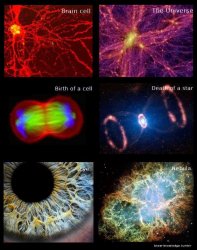Gambit
Well-Known Member
Question:
What scientific evidence do we have for the existence of human consciousness?
Answer:
No evidence. There isn't any objective and measurable evidence that human consciousness even exists.
Why is this relevant? Because atheists demand scientific evidence for the existence of a universal or divine consciousness (a.k.a. God).
We can't objectively measure consciousness. We can only infer it.
Question:
Is there any scientific evidence to infer the existence of a universal or divine consciousness?
Answer:
Yes, most definitely. Due to quantum indeterminism, entanglement, and the observer effect, we have every reason to infer a universal consciousness. In fact, many of the founders of quantum mechanics did exactly that .
What scientific evidence do we have for the existence of human consciousness?
Answer:
No evidence. There isn't any objective and measurable evidence that human consciousness even exists.
Why is this relevant? Because atheists demand scientific evidence for the existence of a universal or divine consciousness (a.k.a. God).
We can't objectively measure consciousness. We can only infer it.
Question:
Is there any scientific evidence to infer the existence of a universal or divine consciousness?
Answer:
Yes, most definitely. Due to quantum indeterminism, entanglement, and the observer effect, we have every reason to infer a universal consciousness. In fact, many of the founders of quantum mechanics did exactly that .
[Eugene Wigner] became interested in the Vedanta philosophy of Hinduism, particularly its ideas of the universe as an all pervading consciousness. In his collection of essays Symmetries and Reflections – Scientific Essays, he commented "It was not possible to formulate the laws (of quantum theory) in a fully consistent way without reference to consciousness." (source: Wikipedia: Eugene Wigner)

